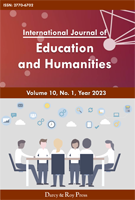Comparative Study of Chinese and Western Literature
DOI:
https://doi.org/10.54097/8w5kd242Keywords:
Chinese Literature; Western Literature; Comparative Study; Expression; Cultural Background; Creative Concepts.Abstract
The purpose of this paper is to comparatively study the differences and commonalities between Chinese literature and Western literature. First of all, the characteristics of the two are compared from three aspects, namely, presentation methods, thematic contents and literary forms. Chinese literature focuses on mood, ambiguity, and emphasizes the natural flow of emotions; while Western literature attaches importance to structure, logic, and pursues innovation in form. In terms of thematic content, Chinese literature tends to express personal emotions and expresses the harmony between human beings and nature and society; while Western literature focuses on the conflict between individuals and society and emphasizes freedom, equality and human rights. In terms of literary forms, Chinese literature coexists in various forms such as poetry, prose and novels, while Western literature takes novels, dramas and poems as its main forms. Secondly, this study explores the reasons for the differences between the two in terms of cultural background, writers' creative concepts and readers' acceptance. Chinese literature is deeply influenced by traditional cultural ideas such as Confucianism and Taoism, emphasizing moral education and philosophy of life; while Western literature is influenced by ancient Greek and Roman myths as well as religious beliefs such as Christianity, focusing on the inner world of man and exploring human nature. In terms of writers' creative concepts, Chinese writers tend to focus on social harmony from the perspective of traditional morality and ethics, while Western writers advocate the liberation of individuality and the pursuit of the realization of personal values. In terms of readers' acceptance, Chinese literature focuses on aesthetic experience and emotional resonance, while Western literature pays more attention to logical reasoning and thinking. The comparative study of Chinese literature and Western literature can help us better understand the diversity of world literature and enrich our concepts of literary aesthetics and creation. At the same time, by learning from the excellent achievements of Western literature, we can promote the innovation and development of Chinese literature.
Downloads
References
Dai Le. What Kind of Literature:The Non-Western Turn in World Literature and Its Significance in China[J]. Social Science Front, 2024,(03):162-175.
Sun Shaozhen. The Dilemma of Language-Centeredness in Western Literary Theory and the Historical Mission of the Rise of Chinese Literary Theory[J]. Chinese Literary Review, 2024,(01): 45-62+126-127.
He Guangshun. The Othering of Literature--An Attempt to Conduct a Study of Chinese and Western Literature[J]. Dongyue Lecture Series,2023,44(10):29-38+191.
Wang Ning. Transcendence from Literary Research to Humanistic Scholarship--Wang Ning on the Governance of Studies[J]. Art Wide Angle,2023,(05):4-12.
Xu Jiao. Practical Use of Quantitative Research--Taking the Study of Chinese and Western Literary Works as an Example[J]. International Public Relations,2023,(14):92-94.
Liao Kebin. National Traditional Characteristics of Chinese Literature[J]. Literary Theory and Criticism,2023,(03):119-143.
Zhang Jian. The concept of "unified literature" and the modernization of Chinese literary studies[J]. Academic Research, 2023,(01):139-150+178.
Zhang Lei. Differences of "Sorrow" in Chinese and Western Literature[J]. Journal of Tongling Vocational and Technical College,2022,21(04):81-85.
Zhou Yijun. Animalized Form" Narrative in Chinese and Western Literature[J]. Jiangxi Social Science,2022,42(11):89-96.
Fang Weigui. The Prescriptive Nature of Language-Early Reflections of Western Scholars on the Relationship between Chinese Characters and Chinese Literature[J]. Literary Studies, 2022,(08):5-15.
He Jianwei. "Opposing Parties", "Chinese Heart" and Qian Mu's Criticism of Dream of Red Mansions[J]. Journal of Dream of Red Mansions,2022,(04):45-60.
Wu Jianxiong. Ancient Literature Teaching Reform in the Context of Returning to the Concept of Literature[J]. Journal of Tianjin University of Electricity,2022,26(02):48-53.
Wang Lin. Selected Congratulatory Remarks on the 40th Anniversary of the Publication of Masterpiece Appreciation[J]. Masterpiece Appreciation,2022,(15):185.
Xu Chuhan. Study on the Association between Western Literature and Chinese Culture[J]. Literature and Art Weekly,2022,(05):20-22.
Yao Mingming. An overview of research on Chinese literature and the eastward advancement of western science and technology since modern times[J]. Comparative Research on Cultural Innovation,2022,6(13):183-186.
Gu Pengfei. "New Goyi" Interpretation: The Localization of Western Literary Psychology Interpretation[J]. Journal of Northwestern University (Philosophy and Social Science Edition),2022,52(02):93-101.
Wang Ning. Western Centrism and Cultural Relativism in World Literature[J]. People's Forum-Academic Frontier, 2022, (02):32-39+99.
]Chen Lin.Asia Pacific Translation and Intercultural Studies [J],2021,8(3).
He Suixian. On the Development of Xia Zhiqing's Critical View of Chinese Literature[J]. Journal of Jiangxi Normal University of Science and Technology,2021,(04):105-110.
Liu Jiang. The acceptance of western influence in modern Chinese literature[J]. Journal of Liaodong College (Social Science Edition),2021,23(04):88-93.
Downloads
Published
Issue
Section
License
Copyright (c) 2024 International Journal of Education and Humanities

This work is licensed under a Creative Commons Attribution 4.0 International License.

















